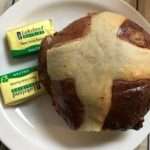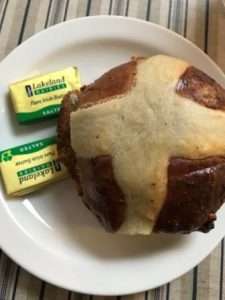Cavan butter and Brexit
The hot cross bun at the café in Glastonbury came with two pats of butter, each with a distinctive Lakeland Dairies wrapper, bearing a shamrock logo. Butter from the Lakeland creamery at Killeshandra in Co Cavan seems common in this area. Once, when asked in a Taunton café, none of the staff seemed quite sure why they were using Irish butter, one suggested that it was what was bought at the cash-and-carry.
Butter from Ireland is entirely unremarkable, as are products from other European countries. Who would pick up Président camembert or brie cheese, and comment that it was French? Or a bottle of Leffe beer, and say it was Belgian? Who would purchase any of a range of European produce and think their choice was something that was notable? In a year’s time, will all this have changed? Will all the things that we might now routinely buy be missing from the shelves? Will the supermarkets resemble something from the old East Germany, choices limited and some items entirely absent?
A politics lecturer at the LSE used to argue that the claims by governments to have mandates for particular policies were unfounded. People rarely read manifestos and rarely voted on the basis of particular policies, instead they voted against what they disliked; governments were voted out of power rather than oppositions being voted in to power.
People voted for Brexit on the basis of what they disliked: they disliked the perceived waves of immigration and they disliked the perception that they were controlled by a remote elite (that the immigrants whom they disliked were not European, and that the remote elites who actually controlled them were within their own country, is now immaterial). It is hard to imagine that anyone voted for Brexit in order to have shops that resembled something from the Soviet bloc.
Amongst the political leaderships on both sides, who are guilty of duplicity and obfuscation, there must be a growing realisation that acrimonious arguments regarding immigration and ethnic and religious diversity, and inconclusive debates over the location of constitutional power, are threats to the thing we most take for granted – the free movement of goods. It is Co Cavan, and its cross-border butter trade, that points toward an honorable settlement of a dispute that has caused so much rancour and division.
The European Union will make no concessions to the United Kingdom without the backstop provision that Northern Ireland remains within the single market and customs union; the Cavan butter will move freely across the border. The United Kingdom cannot allow Northern Ireland to become something separate from the rest of the Union, so must itself remain within the single market and customs union; the Cavan butter will cross the Irish sea. No-one wants empty supermarket shelves or an end to Continental holidays.



What’s missing from the Tory statements is that NI is separate and has been so since the 1920 government of Ireland act. For while great fuss was made back then and since, and even in the Good Friday Agreement, it remains that NI is de facto and de jure a Free State that can at will decide to govern itself. And we’d be better off thinking in terms of soccer, not alone with NI but with Scotland too than the existing witterings by Kippers.
Indeed I’d go so far as to say England’s issue will not be with NI but with Scotland.
On trade’s of primary or secondary produce I don’t see any issue. Be that milk and butter from Ireland or Easy Peeler’s from Spain. Where I think England is in for a profound shock will be with Finance and the activities of the City. For much as the firms are manoeuvring to a Status Quo Anti by having subset offices in other countries in effect ‘doing a Rothschild’ on it. It’s very unlikely that would last very long. Mind you, if the Tories had the combined brain to strike a match this could provide a very neat fudge for NI. And giggle of all giggles that the banks now on the Liffey move to the Laggan or Foyle.